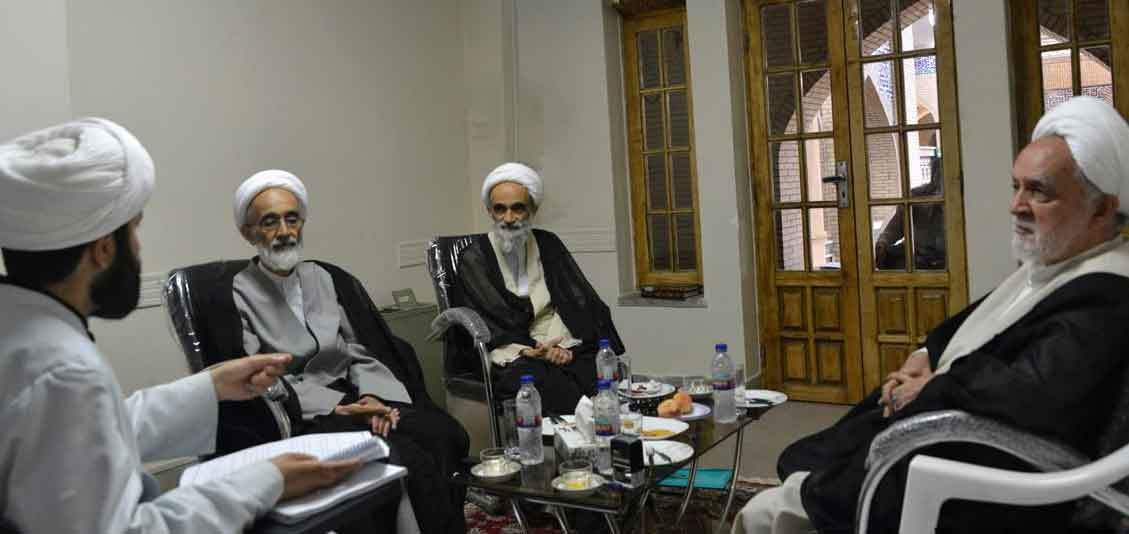Oral Exams of Seminary

a critical opportunity for students’ educational capacity analysis
Clergymen and students are busy with exams as well as enjoying learning. Maybe the “oral exams” are not so familiar to those out of Seminary, but students of Seminary are totally accustomed to and a little afraid of it.
Education, whether empirical or human, always needs strong will. Of course the role of the teachers and the educational system shouldn’t be neglected. Should a student achieve his educational goal, he needs to consider not only his capabilities, but also the strong and weak points of the educational system in which he is going to educate. He even needs to think of the scientific origins in order to figure out the logical relationship between the educator and the educatee. Seminary is a historical center in which religious thoughts are taught. Today, when we look at the oldest school of this country, we see that it has prepared not only Faqih, but also other sciences like astronomy and medicine. Anyway, Seminary is now a place in which scientists are grown in different courses such as Feqh, Osul, Tafsir, philosophy and Kalam. One of the oldest customs in this system is “discussion” which is done after the class and pre-study before it. A little thought shows us that this old custom through which lessons are fixed in the students’ mind is being expanded by the higher level theologues the result of which is “Oral Exams” as passages toward higher education and a proof of previous studies.
In addition to oral and written exams at different periods before the revolution and at Mashhad’s, Qom’s, and Najaf’s Seminary, and also considering the oral exams as the normal way of examination in Seminary, since 1984 the curriculums improved, and the written exams were added, and finally they were decided to be held separately.
After the Islamic revolution, written exams became popular to get a sound understanding of what students had learned and how well had learnt it, and therefore determine which students had really studied. Written exams evaluate the students, but a week, more or less, is not enough so they need to study their notes to pass the exams. There might be negative results which educators should notice and try to make the exams focused on understanding. Men of knowledge know that it is understanding which is valuable and not memorizing. Motahhari says memory is a store and education is the change of thinking, problem-solving and finding solutions.
Xorasan Seminary, as the second Seminary in Shiite world considering Feqh, scientific and religious systems productions, and the main reference for Islamic thoughts and culture in the area, has started the oral exams for Xarej-e-Feqh and Osul since Saturday 8th of July with 1560 students and 38 Xarej teachers of Xorasan Seminary in 11 different groups.
Oral exams this year were a little different from the last year. For example, the number of the participants have improved, and the second and third levels have been squared away. Assessment for both teachers and students depend very much on the oral exams, and vice chancellor of education has skilled teachers and experts to hold them. There is no doubt that oral exams are basically designed to help improve the educational basis of the students in Seminary, and it surely has helped them get scientifically more powerful to have an influential role in the educational and missional world. Seminary also tries to improve the basics of theorizing in Feqh and Osul both for teachers and students. Xorasan Seminary is checking what teachers and students are most worried about and organizing their thoughts and opinions in order to smooth their improvement.
Public relations of Seminary, too, is looking for worries and needs in order to take an effective action to help solving them and producing new thoughts. It is for sure that reflecting these points of views and integrating precise information can lead us to the explanation of a large number of complexities. There is still a long way towards the peak, but these steps can certainly lead to fortunate changes inshallah.
Related News

“The Heritage of Karbala” Conference Calls
As reported by the public relations of Xorasan Seminary, the call for a conference entitledRead More

We Should Show People More Of The Holy Defense Life Style
As reported by the public relations of Xorasan Seminary, Brigadier General Nejati met with AyatollahRead More

